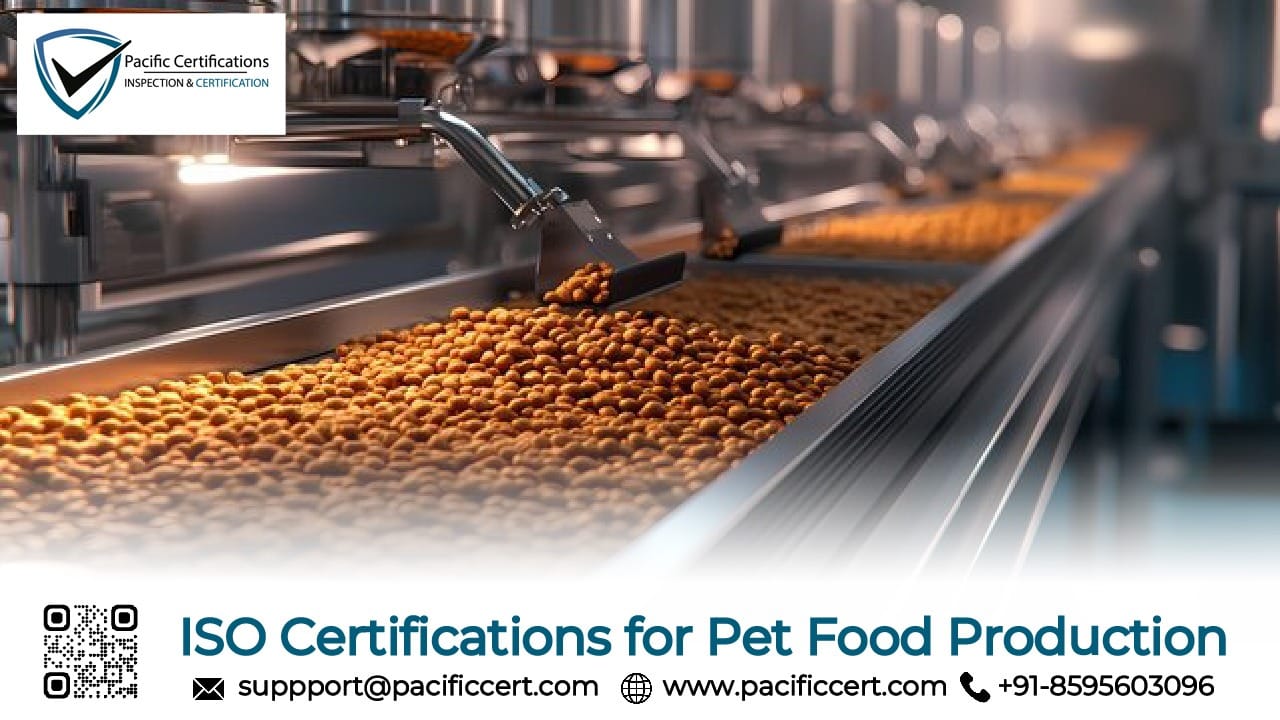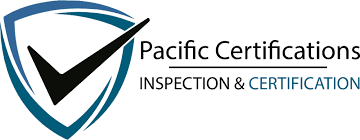ISO Certifications for Pet Food Production Businesses, Requirements and Benefits

Quick Summary
"ISO certifications are becoming essential for pet food manufacturers, helping them manage unique risks such as raw material contamination, mycotoxins, and inconsistent nutrition. Key standards include ISO 22000 (Food Safety Management) with HACCP integration, ISO 9001 (Quality Management), ISO 14001 (Environmental Management), ISO 45001 (Occupational Health & Safety), ISO 17025 (Testing & Calibration), and ISO/TS 22002-1 (Prerequisite Programs). Requirements involve documented policies, hazard analysis, traceability, internal audits, and continuous improvement. Securing certification boosts food safety, ensures consistent product quality, enables market access and regulatory compliance, enhances efficiency, supports employee well-being, and demonstrates environmental responsibility. Amid rising demand for premium and transparent pet nutrition, certified producers are better equipped to navigate stricter regulations, reduce recalls, and strengthen consumer trust."
ISO Standards for Pet Food Production
In today’s global marketplace, ensuring the safety and quality of pet food products is a vital commitment to consumer trust. With an increasing focus on transparency and product integrity, ISO certifications for pet food production have emerged as essential frameworks for manufacturers looking to meet international standards.
Pet food production, while resembling human food processing in many ways, involves unique risks such as contamination from raw animal materials, mycotoxins in grains, and inconsistent nutrient composition. ISO standards offer structured methods to identify hazards, establish controls, and maintain hygiene and traceability throughout the supply chain.
Driven by the growing demand for safe and nutritious animal feed, pet food producers are under constant scrutiny from regulatory bodies, retailers and discerning consumers. As a result, adopting ISO standards helps organizations implement robust quality management systems and food safety protocols, positioning them as responsible and reliable suppliers in a competitive industry. ISO standards safeguard both animal health and brand integrity.
We specialize in guiding pet food producers through seamless ISO certification. Reach us at [email protected] or +91-8595603096. Explore more at www.pacificcert.com
Applicable ISO Standards for Pet Food Production
Multiple ISO standards are applicable to pet food production, depending on the scope of operations. Below are the key standards to consider:
ISO 22000: Food Safety Management Systems
This standard sets out the requirements for a food safety management system and is directly relevant to pet food manufacturers. It integrates HACCP principles with ISO’s management system approach.
ISO 9001: Quality Management Systems
Widely recognized, ISO 9001 ensures consistent quality and continuous improvement in processes—vital in maintaining pet food production standards.
ISO 14001: Environmental Management Systems
As sustainability becomes more important, ISO 14001 helps pet food producers manage their environmental responsibilities effectively.
ISO 45001: Occupational Health & Safety
Workplace safety in production environments is a top concern. ISO 45001 provides a framework to control risks and improve employee safety.
ISO 17025: Testing & Calibration Laboratories
Pet food often requires lab testing for nutritional composition and contaminants. ISO 17025 accreditation ensures labs produce reliable results.
ISO/TS 22002-1: Prerequisite Programs on Food Safety
Specifically tailored for food manufacturers, including pet food, this technical specification supports ISO 22000 implementation with practical controls.
Click here to find out more applicable standards to your industry
At Pacific Certifications, we are a globally recognized certification body accredited to issue management system certifications. While we do not provide consultancy or implementation services, we play a pivotal role in the auditing and certification process.
We help pet food producers demonstrate compliance with international ISO standards through:
- Conducting impartial and professional certification audits
- Issuing accredited certificates post successful audit
- Providing surveillance and recertification services
With extensive experience in food sector certifications, we support businesses of all sizes in showcasing their commitment to excellence and safety.
Looking to comply with global quality and safety regulations? Let us help! Email [email protected] or call +91-8595603096 today!
Requirements of ISO Certifications for Pet Food Production
To become ISO-certified, organizations must comply with specific structural, documentation, and operational criteria. Here’s what pet food producers need to consider:
ISO 22000: Food Safety Management System
- Establish a documented Food Safety Policy
- Conduct hazard analysis (HACCP principles)
- Identify Critical Control Points (CCPs)
- Maintain traceability and recall procedures
- Monitor, measure, and continually improve food safety performance
- Ensure internal audits and management reviews
ISO 9001: Quality Management System
- Define a Quality Policy and Objectives
- Demonstrate leadership commitment
- Address risks and opportunities
- Manage documented information (procedures, records)
- Monitor customer satisfaction
- Drive continual improvement
ISO 14001: Environmental Management System
- Identify environmental aspects & impacts
- Ensure legal compliance and obligations
- Set environmental objectives and plans to achieve them
- Operate with a focus on resource efficiency and pollution prevention
- Conduct environmental performance evaluations
ISO 45001: Occupational Health and Safety Management System
- Identify and control health & safety hazards
- Ensure worker consultation and participation
- Implement risk assessments and mitigation measures
- Maintain emergency preparedness and response plans
- Improve OH&S performance through regular monitoring and review
ISO/IEC 17025: Testing and Calibration Laboratories
- Prove technical competence of staff
- Validate testing and calibration methods
- Ensure equipment calibration and traceability
- Manage test result accuracy & integrity
- Maintain a quality management system for laboratory processes
ISO/TS 22002-1: Prerequisite Programs on Food Safety
- Control construction and layout of facilities
- Maintain equipment suitability and cleaning procedures
- Address pest control, waste management, and personnel hygiene
- Ensure proper transportation and storage conditions
- Maintain allergen management and product information
All these requirements are audit-focused and must be implemented effectively before certification.
Join the list of trusted brands that meet international standards. Contact Pacific Cert now at [email protected] | +91-8595603096 |
Benefits of ISO Certifications for Pet Food Production
Achieving ISO certification offers pet food manufacturers numerous strategic and operational advantages:
- Food Safety: ISO 22000 and related standards reduce contamination risks and ensure compliance with global food safety expectations.
- Product Quality: ISO 9001 helps in achieving consistent quality, reducing rework and customer complaints.
- Trust and Market Access: Certifications demonstrate credibility and can be pivotal for export and retail partnerships.
- Compliance: ISO standards align with legal frameworks across jurisdictions, minimizing non-compliance risks.
- Efficiency: Documented procedures and clear workflows promote efficiency and reduce waste.
- Employee Engagement: ISO 45001 encourages safer, healthier workplaces.
- Environmental Responsibility: ISO 14001 supports sustainable manufacturing practices, aligning with consumer and stakeholder expectations.
Recently, the pet food industry continues its upward trajectory, driven by the "humanization" of pets and rising demand for premium, organic, and functional products. According to the Global Pet Food Market report, the industry is projected to reach USD 140.2 billion in coming years.
With stricter regulations, especially in developed markets, ISO certification is a prerequisite for business continuity. Companies with recognized certifications are better positioned to thrive amid increasing recalls, evolving labeling requirements, and sustainability mandates.
Get certified with Pacific Certifications and take a step toward operational excellence and global recognition. Our expert auditors are ready to guide you through a smooth and efficient certification process!
Pacific Certifications is accredited by ABIS, in case you need support with ISO certification for your Pet Food Production business, please contact us at [email protected] or +91-8595603096
Ready to get ISO certified?
Contact Pacific Certifications to begin your certification journey today!
Suggested Certifications –
Read more: Pacific Blogs

